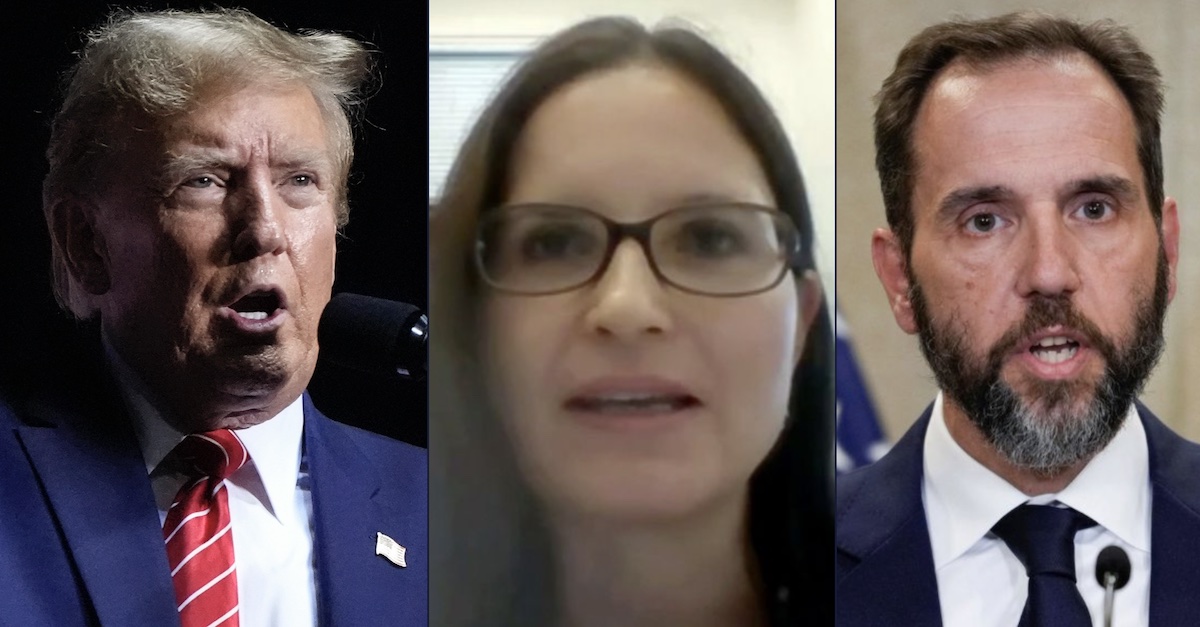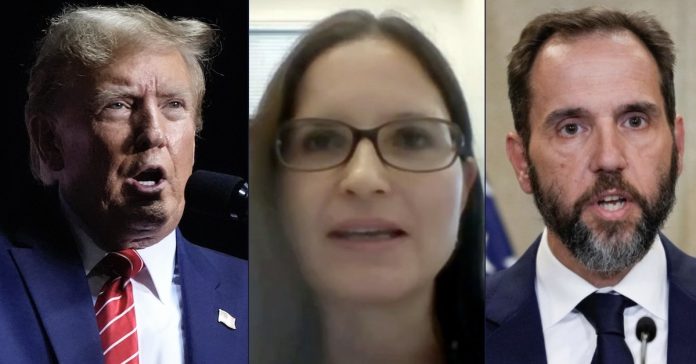
Donald Trump (AP Photo/Mike Stewart), File), U.S. District Judge Aileen Cannon, special counsel Jack Smith (AP Photo/J. Scott Applewhite, File)
On the eve of Donald Trump’s hush-money trial in Manhattan, an exasperated Jack Smith pleaded with the judge in the Mar-a-Lago case not to accept defense claims that the former president’s lawyers are too busy to meet the deadlines they’ve been given six extra months to meet.
On Saturday, Trump’s lawyers asked U.S. District Judge Aileen Cannon to adjourn upcoming May 9 deadlines to disclose their expert witnesses and to file what is known as a CIPA § 5(a) Notice, which the Department of Justice describes as the “linchpin” of the Classified Information Procedures Act.
The defense has asked for at least nine more weeks of delay, noting that Trump is scheduled to go on trial in New York starting on Monday and continuing for at least six weeks. The defense claimed to need three weeks of time after the first Trump trial ends before responding to the Mar-a-Lago deadlines.
“As explained below, the May 9 deadlines would deny President Trump his constitutional right to participate in critical aspects of his defense, and infringe on his constitutional right to counsel of his choice in this case,” the Trump filing said, arguing that the defendant and his lawyers Christopher Kise and Todd Blanche simply do not have the time to juggle both cases.
“The May 9 deadlines,” the defense added, “will require lengthy classified submissions and extensive time in a SCIF to prepare and discuss those submissions, which is time President Trump and his attorneys simply do not have during the trial that is about to begin in New York.”
Special counsel Smith responded on Sunday that the defense has already gotten half a year of additional time to file on these two issues but are acting as if the deadlines snuck up on them without notice.
“This Court set the May 9 deadline fully apprised of defendant Trump’s New York trial. Although the defendants’ motion reads as though the Court were unaware of Trump’s other case, and as if the defendants had no forewarning that a Section 5 deadline would be set, those premises are plainly wrong,” the government said. “The defendants have had ample notice that these deadlines would be scheduled and have already had months to complete the work.”
Smith, reminding the defense that Trump does have local counsel “who have obtained all the necessary security clearances” and who should be able to meet the deadlines, asserted that the former president and his lawyers Kise and Blanche should not be permitted to achieve further “open-ended” delay based on having to fight multiple criminal cases simultaneously. In essence, the special counsel argued that Trump should not be rewarded for choosing the same lawyers to defend him in the Mar-a-Lago and New York criminal cases.
“Counsel should already be prepared to meet these deadlines, and in any event, other commitments are not grounds for postponement. Trump elected to engage the same counsel of record in multiple serious criminal matters, and his counsel agreed to the multiple engagements,” Smith said. “Having made such decisions, they should not be allowed to use their overlapping engagements to perpetually delay trial in this case. Not to mention, the defendants have capable local counsel who can contribute to the work. The Court should reject the defendants’ latest delay tactic and maintain the established deadline.”
Smith emphasized the “importance” of the “crucial” CIPA § 5(a) Notice in “getting the case to trial.” The section exists for the defense to reveal whether it “reasonably expects to disclose or to cause the disclosure of classified information in any manner in connection with any trial or pretrial proceeding involving the criminal prosecution of such defendant.”
“If the defendant fails to comply with the requirements of subsection (a) the court may preclude disclosure of any classified information not made the subject of notification and may prohibit the examination by the defendant of any witness with respect to any such information,” the statute says.
The special counsel said the Trump defense team has the classified discovery it needs — and has had “nearly all” of it since November — in order to file the notice. Smith urged Cannon to reject the defense arguments as she did before.
“Their motion is therefore tantamount to a motion for reconsideration, which should be denied. The procedural history alone is sufficient grounds for denial. Defendants have known since this case was charged that they would need to file a CIPA Section 5 notice. As of November 2, 2023, they had nearly all classified discovery produced to date, an imminent CIPA Section 5 deadline, and an imminent expert witness disclosure deadline. And they have had access to the Government’s expert disclosures since the beginning of this year,” Smith said. “It is true that the defendants must access that submission in a SCIF. But they have already had three months to do so, which is more than adequate time. In fact, the Court’s July scheduling order set the defense expert disclosure deadline one week after the Government’s.”
The special counsel concluded by slamming the defense for “reflexively” seeking delays whenever Cannon sets another deadline, saying, “That must stop.”
“Each time the Court sets a new deadline in this case and attempts to keep it moving toward trial, the defendants reflexively ask for an adjournment. That must stop. The Court should deny defendants’ motions to continue the May 9 expert witness disclosure and CIPA Section 5 notice deadlines,” Smith said.
Read the Trump request and the special counsel’s response here and here.
Have a tip we should know? [email protected]

